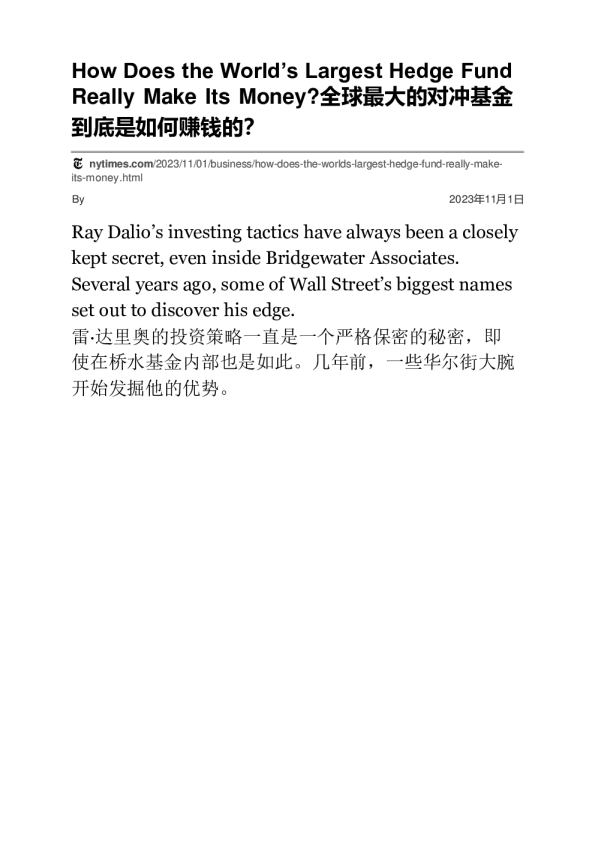How Does the World’s Largest Hedge Fund Really Make Its Money?全球最大的对冲基金到底是如何赚钱的?

nytimes.com/2023/11/01/business/how-does-the-worlds-largest-hedge-fund-really-make-its-money.html 2023年11月1日 By Ray Dalio’s investing tactics have always been a closelykept secret, even inside Bridgewater Associates. Several years ago, some of Wall Street’s biggest namesset out to discover his edge. 雷·达里奥的投资策略一直是一个严格保密的秘密,即使在桥水基金内部也是如此。几年前,一些华尔街大腕开始发掘他的优势。 Since founding Bridgewater in his Manhattanapartment in 1975, Ray Dalio has been said tohave developed prodigious skill at spotting,and making money from, big-picture globaleconomic or political changes. 自从1975年在曼哈顿的公寓创立桥水基金以来,据说雷·达里奥(Ray Dalio)在发现全球经济或政治大局变化并从中赚钱方面拥有惊人的技能。Credit...Xinhua News Agency, viaGetty Images新华社,盖蒂图片社 Rob Copeland罗布·科普兰 Rob Copeland is a finance reporter for The Times. Heis the author of “The Fund: Ray Dalio, BridgewaterAssociates and the Unraveling of a Wall StreetLegend,” from which this article is adapted.罗布·科普兰是《泰晤士报》的财经记者。他是《基金:雷·达里奥、桥水基金和华尔街传奇的揭秘》一书的作者,本文改编自该书。 Nov. 1, 2023 2023年11月1日 For years, the whispered questions have passed fromone Wall Street trading floor to the next. 多年来,这些低声提问一直从华尔街的一个交易大厅传到另一个交易大厅。 Bridgewater Associates, a global investing force,had$168 billion under management at its peak in 2022,making it not just the world’s largest hedge fund, butalso more than twice the size of the runner-up. Bridgewater’s billionaire founder, Ray Dalio, wasomnipresent in the financial media and said publiclythat he had cracked what he termed “the holy grail” ofinvesting, including a series of trading formulas boundto make money, “by which I mean that if you find thisthing, you will be rich and successful.” 全球投资力量桥水基金(Bridgewater Associates)在2022年巅峰时期管理着1680亿美元的资产,不仅成为全球最大的对冲基金,而且规模是第二名的两倍多。桥水基金的亿万富翁创始人雷·达里奥(Ray Dalio)出现 在财经媒体上,他公开表示,他已经破解了他所谓的投资“圣杯”,其中包括一系列必然赚钱的交易公式,“我的意思是,如果你找到这个东西,你就会变得富有和成功。” So why didn’t anyone on Wall Street know much ofanything about it? 那么为什么华尔街上没有人对此了解太多呢? Since founding Bridgewater in his Manhattanapartment in 1975, Mr. Dalio has been said to havedeveloped prodigious skill at spotting, and makingmoney from, big-picture global economic or politicalchanges, such as when a country raises its interestrates or cuts taxes. That made both a lot of sense andnone at all; what was it about Bridgewater that madeitso much better at predictions than any other investorin the world trying to do the exact samething? 自1975年在曼哈顿的公寓创立桥水基金以来,据说达利奥先生在发现全球经济或政治大局变化(例如一个国家何时提高利率或减税)并从中赚钱方面拥有惊人的技能。。这既很有道理,又毫无道理。桥水基金为何比世界上任何其他试图做同样事情的投资者都更擅长预测? Bridgewater earned worldwide fame for navigating the2008 financial crisis, when the firm’s main fund rose9percent while stocks dropped 37 percent, makingMr.Dalio a sought-after adviser for the White Houseand Federal Reserve and attracting newdeep-pocketedclients to his fund. Yet the hedge fund’soveralldescriptions of its investment approach could bemaddeningly vague. Mr. Dalio often said he relied onBridgewater’s “investment engine,” a collection ofhundreds of “signals,” or quantitative indicators that amarket was due to rise or fall. Bridgewater rarelyrevealed any details of these signals, citing competitivepressure, but if they pointed to trouble ahead or evento uncertainty, Bridgewater said it would buy orsellassets accordingly—even if Mr. Dalio’s own gut mighthave told him otherwise. 桥水基金因应对2008年金融危机而闻名于世,当时该公司的主要基金上涨了9%,而股票却下跌了37%,达利奥先生因此成为白宫和美联储广受欢迎的顾问,并为他的公司吸引了新的财力雄厚的客户。基金。然而,该对冲基金对其投资方法的总体描述可能极其模糊。达里奥经常说,他依赖桥水基金的“投资引擎”,这是数百个“信号”或市场上涨或下跌的定量指标的集合。桥水基金以竞争压力为由,很少透露这些信号的任何细节,但如果这些信号表明未来存在麻烦,甚至不确定性,桥水基金表示将相应地购买或出售资产——即使达里奥自己的直觉可能告诉他情况并非如此。 This supposed conquering of his base instincts wascentral to Mr. Dalio’s identity and expressed in hismanifesto, “Principles,” which prescribed a doctrine of“radical transparency” and listed hundreds of rules for how to overcome one’s psyche. (One rule reads, inpart: “Not all opinions are equally valuable so don’ttreat them as such.”) 这种所谓的对基本本能的征服是达里奥先生身份的核心,并在他的宣言《原则》中得到了表达,该宣言规定了“彻底透明”的学说,并列出了数百条如何克服个人心理的规则。(一条规则的部分内容是:“并非所有意见都同样有价值,所以不要这样对待它们。”) What confused rivals, investors and onlookers alikewas that the world’s biggest hedge fund didn’t seem tobe much of a Wall Street player at all. Much smallerhedge funds could move the markets just by rumors ofone trade or another. Bridgewater’s heft should havemade it the ultimate whale, sending waves rollingevery time it adjusted a position. Instead, the firm’sfootprint was more like that of a minnow. 让竞争对手、投资者和旁观者感到困惑的是,这家全球最大的对冲基金似乎根本不像华尔街的参与者。规模小得多的对冲基金可能仅仅通过一项或另一项交易的传言来影响市场。布里奇沃特的重量本应使其成为终极鲸鱼,每次调整位置时都会掀起波浪。相反,该公司的足迹更像是一条小鱼。 What if the secret was that there was no secret?如果秘密就是没有秘密怎么办? The book from which this excerpt is drawn is based onhundreds of interviews with people in and around Bridgewater Associates, including current and formerinvestment employees. It also relies oncontemporaneous notes, emails, recordings, courtrecords, myriad other internal and external companydocuments, and published interviews and articles. Mr.Dalio and other Bridgewater executives